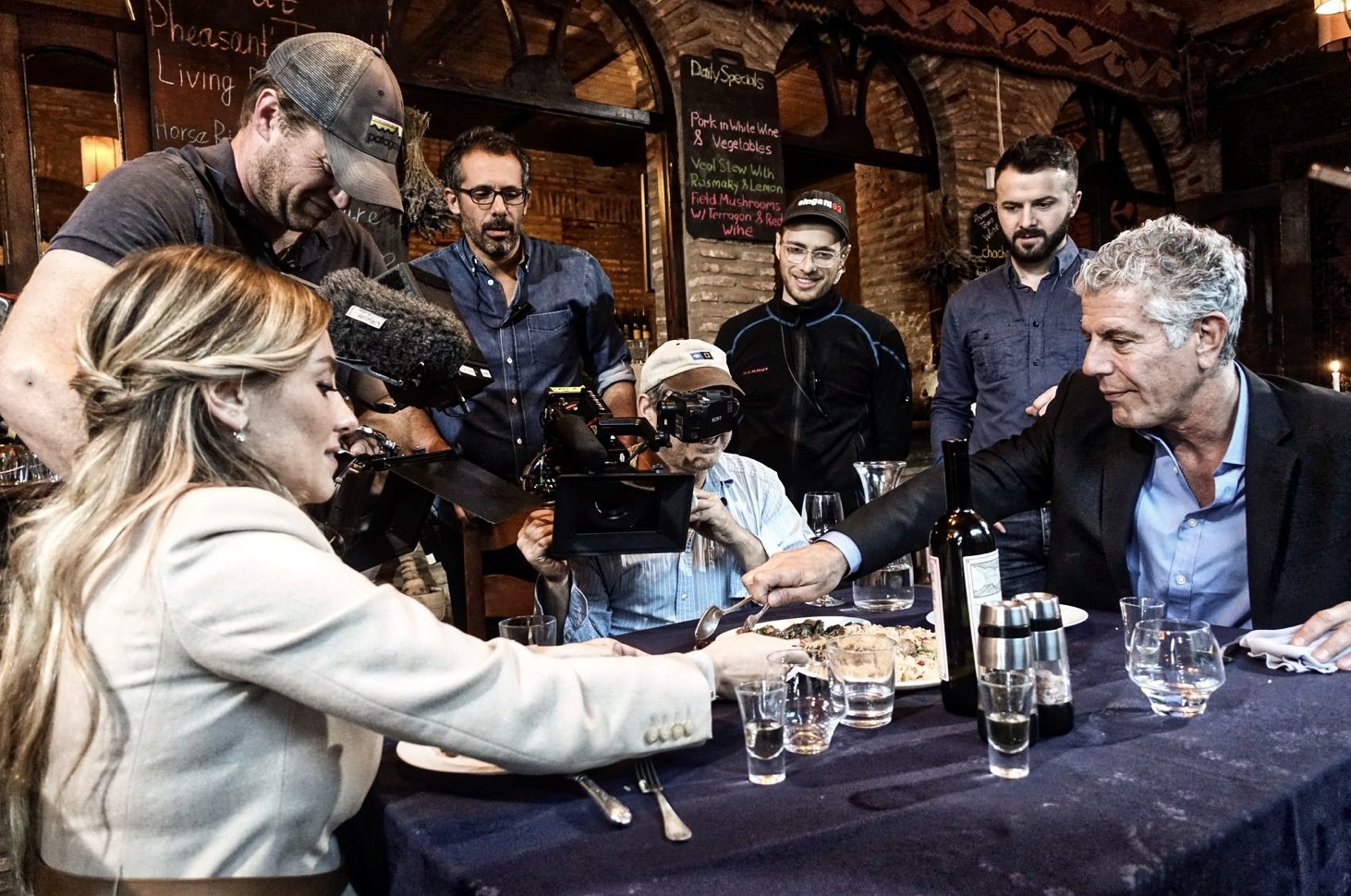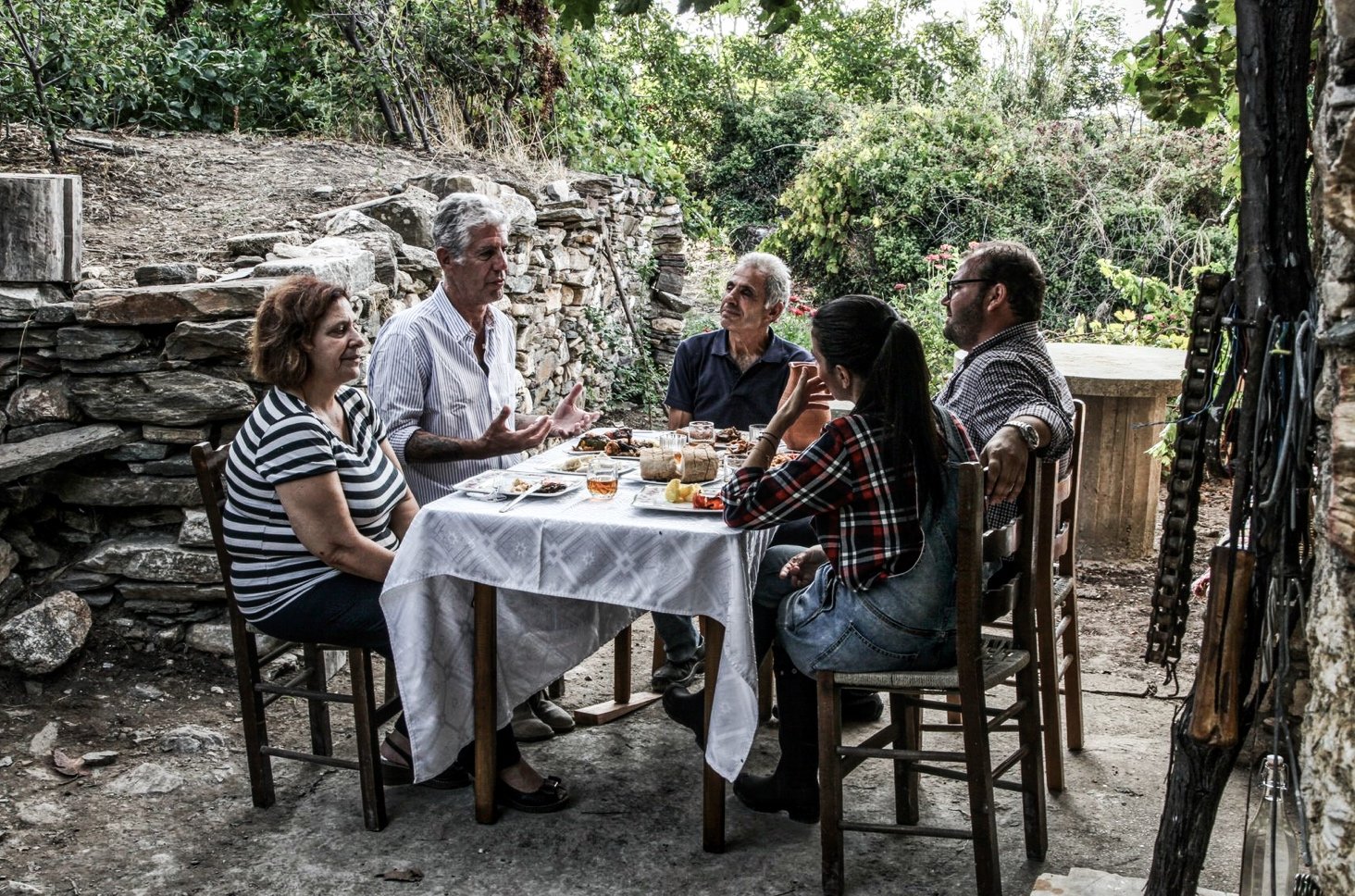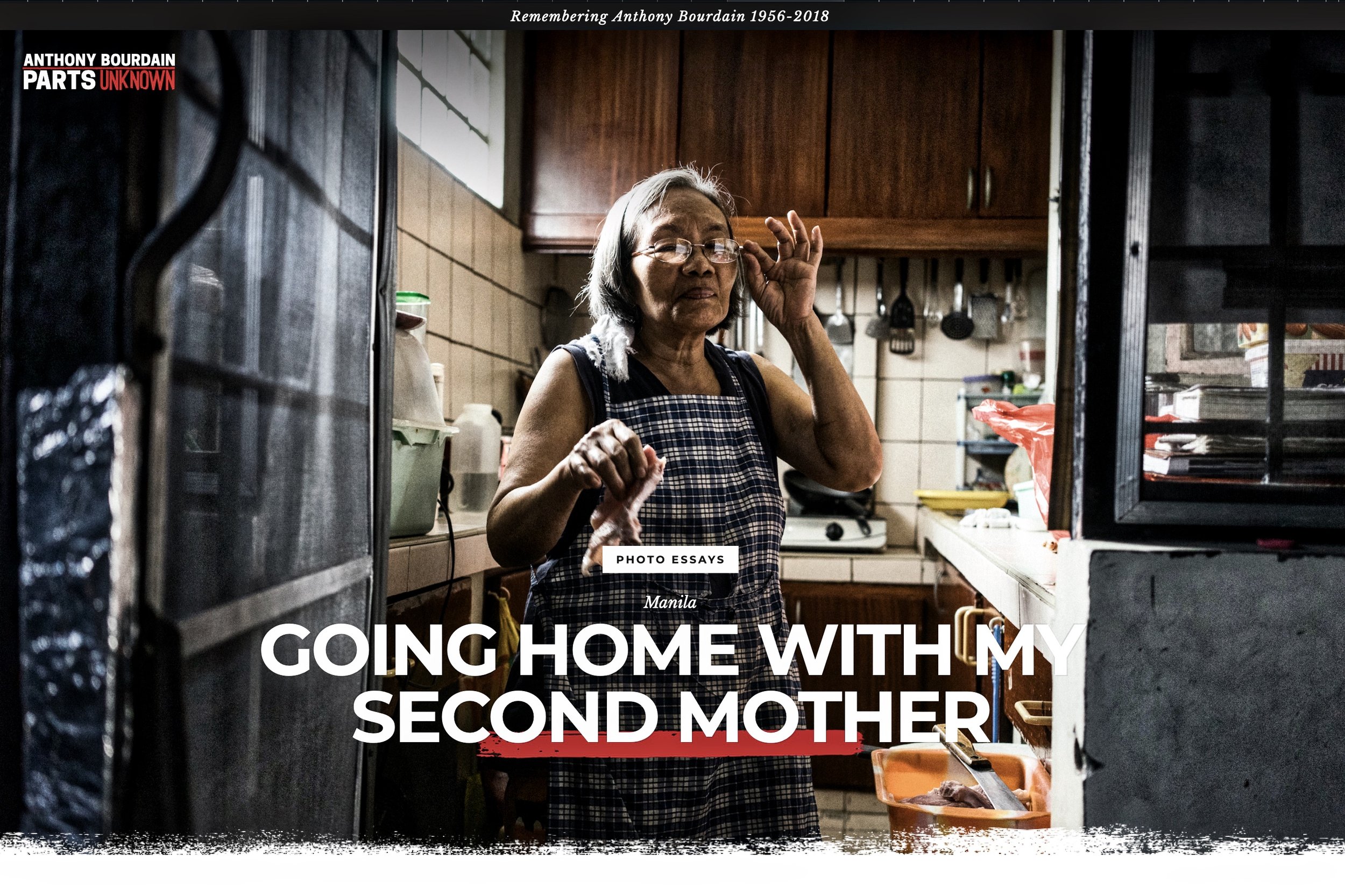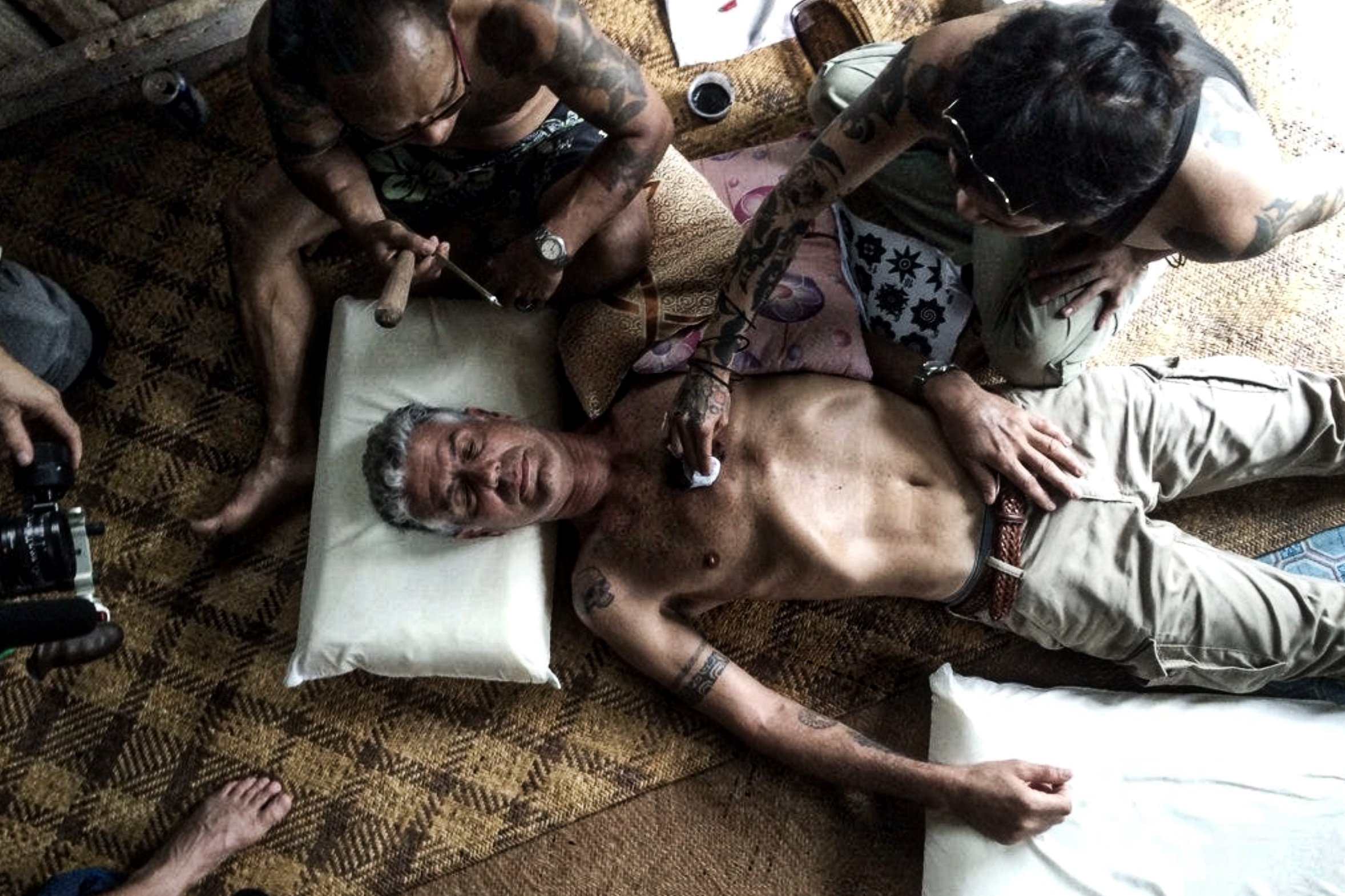“I don’t know what it says about a place that since I’ve arrived in this country … I’m either drinking or hung over.” This was Tony Bourdain in Georgia (the country, not the state), faithful sidekick Zamir Gotta in tow.
One of the many joys of Tony Bourdain’s sojourn to Tbilisi, Georgia, for CNN’s Parts Unknown in November 2015 comes near the end of the hour, when gallery owner Tamuna Gvaberidze, the friend of Keti Borchorishvili, Georgia’s Deputy Minister of the Economy (“I like to show off my country! You know, I want to sometimes scream, ‘Look! This is my country! Come and visit!’” ) tells Bourdain that he bears a striking resemblance to the filmmaker David Lynch.
This is not entirely flattering to Bourdain, as Lynch is a full decade older.
Not true, Bourdain protests. “I’m David Lynch? Really? He has better hair.”
Gvaberidze turns to Borchorishvili — who, remember, is the country’s deputy minister for the economy —and tells her friend: “I’m so happy he says he likes Georgia, really.”
“Why would I not?” Bourdain says, downing another shot of chacha, the local brandy.
This, after noting in his voiceover that, “The ladies convinced us to make the 90-minute drive to this village and this restaurant, and I’m glad they did. By the time I’ve had some more of the delicious and lethal chacha and many glasses of Georgian wine, after boiled beets in a wild plum sauce and freshly foraged mushrooms with chilli pepper and mint tarragon, baby lamb stewed in its own fat with cumin and cooked together with wild rice biryani-style… after all this, I am convinced. I am co-opted. I am recruited. Count me as a useful idiot, a witting agent of the Ministry of Tourism, for I may as well be.”
“You’re becoming a Georgian,” Gvaberidze tells him. “Be careful.”
Georgia. Sakartvelo. [sak”art”elo]. A country in Eastern Europe (pop. 3.7 million) — transcontinental, meaning it links Eastern Europe with Western Asia.
Wenn der wind von osten weht. “When the wind blows” — from the north and the northeast.
Neighbours: Russia (north and northeast), the Black Sea (west), Armenia (south), Turkey (southwest), and Azerbaijan (southeast), aka in Russia’s long shadow. Not far from those bastions of peace and civility, Iran and Syria. Best not mention Abkhazia or South Ossetia. That’s how wars start.
Georgia is also known — and this is where Anthony Bourdain and his ever-faithful fixer, sidekick, erstwhile host and one-time travelling companion Zamir Gotta enter the frame — as one of the world’s earliest known sites of winemaking (“‘World’s oldest wine’ found in 8,000-year-old jars in Georgia,” BBC News, 13 Nov. 2017).
Georgian wine has the reputation it has, fresh and pure, because of its unique fermentation process, free of the additives that would be needed if it were bottled and exported but which would affect the natural taste.
And then there’s the food.
Food is considered one of the pillars of Georgian society. You do not mess with the food.
Bourdain’s interest would have been piqued right there. Enter CNN, to pay the bills, and Parts Unknown, to provide the excuse to go.
First, though, there was the small matter of of history, recent and past. Georgia, originally part of Tsarist Russia, was an independent republic under German protection briefly, in 1917, following the Russian Revolution, but found itself invaded and annexed by the Soviet Red Army in 1921.
Georgia, always one of the more rebellious of the former Soviet republics, carved out the independence of a kind with secession from the Soviet Union in 1991 some 70 years later, just two years after the fall of the Berlin Wall, and the die was cast.
The bad blood between Georgia and Russia goes back a long way.
Georgia officially adopted Christianity in the 4th century — you can practically sense the seething hostility from the country’s Islamic neighbours — not to mention those non-believing Soviet Marxists, never too keen on any religion, let alone one with reminders of Russia’s own Orthodox Church, banned by the Soviet apparatchiks at the time.
After the Rose Revolution (peaceful) and official breakaway from post-Soviet Russia in 2003 —“More vodka, Comrade Yeltsin?” — Georgia actively pursued a pro-Western foreign policy and introduced the democratic and economic reforms needed to win the appreciation of — and full integration into — the European Union and NATO.
For Russia, led by Vladimir Putin at the time (yes, Putin has been around that long, pulling strings the entire time) and his ideological partner in crimes against humanity, Dmitry Medvedev, this was distinctly uncool.
And so — the Russo-Georgian War, also known as “the Russian invasion of Georgia” [sic], which broke out in August 2008.
The entire South Caucasus became a fire zone, complete with the bombing of civilian towns and villages and accusations of genocide. Sound familiar? Today, the Russo-Georgian War is considered to be the first European war of the 21st century. It would not be the last.
Human Rights Watch accused both sides of breaching international rules governing war — again, does this sound familiar? — and again, decent, ordinary, everyday working people and their families got the worst of it.
In the end, the International Criminal Court, International Court of Justice and European Court of Human Rights couldn’t figure out what was going on, let alone who was primarily to blame, so why should you?
Enter Bourdain, ZPZ camera crew in tow, with CNN paying the bills, coupled with Georgia’s historic relationship with good food and fine wine.
Of course, having Zamir Gotta in tow — affable, loquacious, willing to put up with all kinds of nonsense at the hands of the famously irascible Bourdain, including, and I’m not making this up, a semi-naked pole dance — helped.
“You need some nightlife,” Zamir tells him, after they fail at a game of roulette in the off-season resort town of Batumi, Georgia’s second city. “I mean, the losers deserve some relief, right?”
“Yes,” Bourdain replies. “(There’s) nothing like a loser in a nightclub and I emanate loser, so let's go.”
“Unsurprisingly,” Bourdain adds in voice-over, “Zamir and I suck at gambling with a force equivalent to a thousand suns. I should have just pulled my pants down and handed over my money the second we walked into the door. But actually, that came later.”
Cue the pole dance. Zamir on the pole. Some sights, once seen, are hard to unsee.
But wait, there’s more.
Together, they sample the local chacha (brandy to you) in Batumi’s aptly named Clouds Bar—as in, the clouds are where your head’s likely to be after downing one too many shots of the local hooch.
They retire t5r8to Sazandari Restaurant, a traditional Georgian eaterie known for its hangover cures. Those cures include chashushuli, slow-cooked veal with tomato and onion seasoned with chillies, coriander and fennel, and khashi, a broth made with beef bones and tripe served with fresh garlic, though Bourdain admits in a moment of weakness that perhaps khashi might not be the best cure for a hangover.
Ditching Zamir temporarily — the semi-naked pole dance might have been a bridge too far — Bourdain moves on to Tbilisi, Georgia’s foremost city (pop. 1.2 million), where he noshes on local culinary delights and debates the meaning of life at Gabriadze Café with expat journalist Paul Rimple, local bureau chief for the online food resource Culinary Backstreets.
Together, they pick their way through a salad of orange, almonds and honey before turning to manly-sized portions of shkmeruli, chicken slow-baked in an oven and simmered in milk and garlic, together with lamb ribs, grilled and served in a pomegranate sauce with slices of fried eggplant and a walnut filling.
Excursions to Sofia Melnikova’s Fantastic Douqan Restaurant (that’s its name) follow, where Bourdain samples khinkali, dumplings filled with broth and spicy beef, eaten in the traditional way using one’s hands, and finally to Culinairum Khasheria, known for its fusion of traditional Georgian soup with caramelized onions and wild trout tartar, and chakapuli stew, made with mussels simmered in tarragon and wine sauce … coupled with yet more shots of chacha — a digestive, naturally; why, what did you think it was for? — and tonis puri, Georgian bread cooked in an outdoor tandoori-style oven.
If by this point you’re thinking the episode is focusing more on food than some of Parts Unknown’s more politically and geographically minded outings, well … you’re not far wrong.
In the end, for all Georgia’s troubled past and geopolitical tensions of the present, Georgia is a remarkably uplifting and life-affirming episode.
I reached out to Zamir before filing this post to the group.
Keep in mind that of all the people who met and had chance encounters with Bourdain along the way. Zamir is one of a relative few who got to know him at his best, and less than best. What better way, then, than to close with Zamir’s own words, in the present day — Zamir Gotta, on the tao of Bourdain and the legacy he’s left behind.
“The Georgia episode happened to be my last one with Tony. While there, he inspired me to come up with my own ‘Zamir Vodka’ brand, which I eventually did. It helps me keep up his legacy. I hope ‘the Bourdain congregation’ follow me and revisit his footsteps in countries like Georgia and Uzbekistan. I’m a lucky man to be able to continue my Peacemaking mission with his blessing. [Georgia] is symbolically sad but a very meaningful episode for me.”
And there it is.
Supplementary reading:
https://medium.com/parts-unknown/georgia-7d4c84411ffd
https://www.reddit.com/r/AnthonyBourdain/comments/j1ndki/tbilisi_georgia_episode_parts_unknown/
https://explorepartsunknown.com/tbilisi/bourdain-off-the-cuff-tbilisi/










